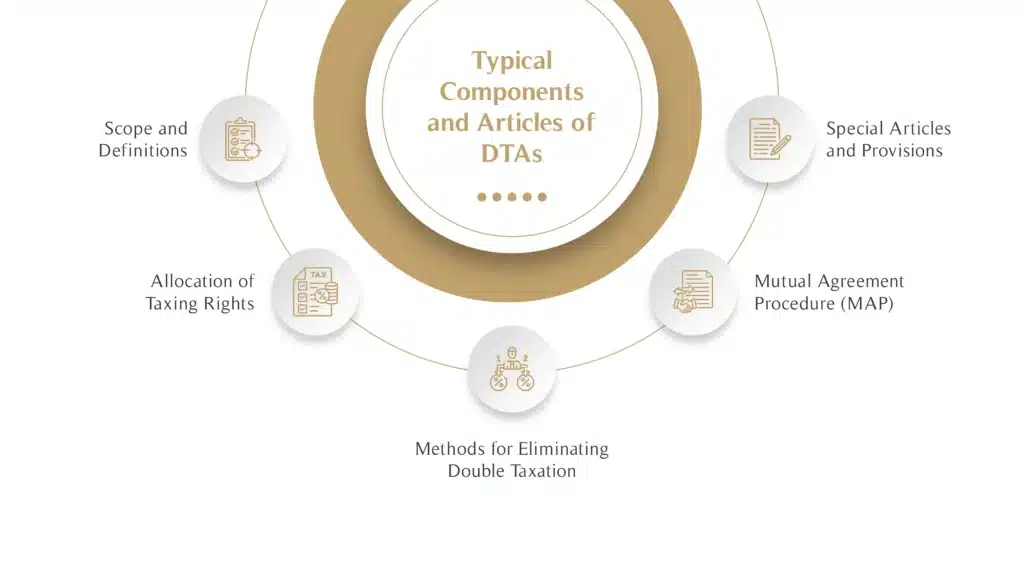Being an expat has lots of advantages, however, there are plenty of things to consider. When it comes to tax in the UAE, you need to make sure you’re doing everything correctly and understand how things are done. Don’t worry, we’re here to explain all the important things you need to know. One of these things is DTA, or double tax agreement.
Thanks to double taxation agreements (DTAs), you can avoid being taxed on the same income in two different countries.
In this article, we’ll explain all you need to know about DTAs.
What is a double tax agreement?
DTAs are economic treaties between two countries that ensure you don’t get taxed twice on the same income. Double taxation becomes an issue if you live in one country, but work in another.
DTAs consist of clear rules and conditions that determine which of the two countries is entitled to tax-specific income. That income can include:
- Earnings
- Dividends
- Royalties
- Pensions
DTAs are important because they help you avoid paying too much tax, and paying tax to the wrong country. In addition to avoiding tax duplication, DTAs can also prevent tax avoidance or evasion.
How double tax agreements work
Although DTAs are unique between every country, they have a primary purpose, and that is to define which of two countries has taxing rights.
If you’re an expat, UK double tax agreements establish your tax residency status. And your tax residency status is determined by considering your domicile status and statutory residence test (SRT).
If you have dual residency – which means you are registered in two countries for tax purposes – you take part in a ‘tie-breaker test’, that determines which country has the right to tax you.
After this is established, you can claim tax relief from either HMRC or the relevant tax authority in your current country of residence.
Purpose of double tax agreements in eliminating or reducing double taxation
There are two main ways to trigger double taxation:
-
- You could be resident in a country taxing worldwide income, and have income in another country.
- You are classed as being a resident in two countries.
If you’re an expat, there’s a very good chance you come under one of the above. So understanding the DTA between the two countries (if one exists) is an essential way to avoid double taxation.
In addition to double tax avoidance, there are other benefits for expats.
- Reduced tax liability – DTAs often have provisions for lower tax credits or tax rates, so you would only pay what is absolutely necessary when it comes to your income.
- Clearer tax obligations – Financial planning can be made harder when you have to work your way around the tax rules of not one but two countries. DTAs make the rules clearer, but don’t be afraid to get in touch if you’re still not sure about any aspect of DTAs.
If you’re a UK expat living in a country that has a DTA with the UK, you’ll specifically benefit from:
- Income tax relief – If you’re paying income tax in Australia, you won’t be taxed on that income in the UK.
- Capital gains tax – This is normally paid in the country where the asset is located.
- Inheritance tax (IHT) – If you’re an expat and you inherit assets overseas, you may avoid double taxation.
Challenges and impact of double tax agreements
Although DTAs reduce the complexities of finances for expats, these treaties can still be complicated. For example, if you’re an international or dual-country resident, your income may still need to be reported in both your home country and country of residence.
If you have a UK business and want to operate in more than one country, tax considerations are very important. You might want to operate pay as you earn (PAYE) and social security contributions. To what extent an employee(s) makes a business liable for the equivalent of corporation tax depends on the length of time and the country.
It’s one thing to get involved in double taxation personally, but if your business is affected, that can be even worse. So make sure you talk to the experts. Our wealth management services support individuals in Dubai, Abu Dhabi and the UK.
Real-world example of a double tax agreement
The UK’s double tax agreement with the UAE is a great example of how you and/or your business can benefit from a DTA.
The treaty not only ensures double taxation avoidance – it also means that you stand to pay no personal income tax, as well as less:
- Corporate income tax
- Property tax
- VAT
Find out more about taxes for expats in the UAE.
Components of Double Taxation Agreements (DTAs)
Typical Components and Articles of DTAs
Double Taxation Agreements (DTAs) are structured based on the OECD Model Tax Convention, which provides a framework for avoiding double taxation for individuals and businesses operating across borders.
Here are the core components typically found in DTAs:
- Scope and Definitions:
DTAs clearly define the scope of the agreement, detailing which taxes and types of income are covered. Commonly included taxes are income tax, corporate tax, and capital gains tax. Key definitions, such as “tax resident,” “business profits,” and “contracting state,” are also specified to avoid ambiguity. The model DTA ensures consistent terminology, making it easier for individuals and businesses to navigate tax laws across jurisdictions. - Allocation of Taxing Rights:
This section outlines how taxing rights are divided between the two countries. For example, it clarifies whether income from employment, dividends, or royalties will be taxed in the country where it is earned (source country) or the taxpayer’s country of residence. - Methods for Eliminating Double Taxation:
To prevent double taxation, DTAs provide two primary methods:- Exemption Method: One country exempts the income from taxation.
- Credit Method: Taxes paid in one country are credited against taxes due in the other.
These provisions ensure that individuals and businesses do not bear an unfair tax liability.
- Mutual Agreement Procedure (MAP):
MAP is a dispute resolution mechanism allowing taxpayers to address disagreements between tax authorities over the application of the DTA. It’s a vital component that ensures fair treatment and avoids prolonged legal battles. - Special Articles and Provisions:
Specific articles address unique situations, such as income from shipping, pensions, and inheritance tax. Provisions to combat tax evasion or abuse of the treaty are also common.
You can learn more about inheritance tax planning and advice.
Impact of DTAs on Domestic Laws
Treaty Overrides of Domestic Laws
A key principle of DTAs is that they often override domestic tax laws to ensure treaty obligations are fulfilled. This concept, known as treaty overrides domestic laws, protects taxpayers from double taxation even if local laws contradict the treaty provisions. For instance, if a country’s domestic law conflicts with the DTA, the treaty provisions take precedence.
DTAs: A Shield, Not a Sword
DTAs are designed to act as a shield against double taxation, preventing individuals and businesses from being taxed twice on the same income. However, they cannot be used as a taxation sword to avoid taxes entirely. This principle is fundamental to the balance and fairness of international tax treaties.
Judicial Decisions and Section 132
Judicial decisions play a critical role in resolving conflicts between domestic law and treaties. Courts often reference provisions like section 132 to establish that DTAs are binding and must be honoured over conflicting domestic laws. This ensures a level playing field for taxpayers and governments alike.
Permanent Establishment and Business Profits
What is a Permanent Establishment (PE)?
A permanent establishment (PE) is a fixed place of business in a foreign country where substantial operations occur. Under most DTAs, a PE is a prerequisite for a country to claim taxation rights on business profits generated within its borders.
Examples of activities that may qualify as a PE include:
- Building sites or construction projects lasting more than 12 months.
- Installation projects or facilities used for operations.
- Offices, factories, or any fixed place of business used for core activities.
Activities deemed preparatory or auxiliary in character (e.g., warehousing, research) are generally excluded from PE status.
Attribution of Business Profits to a PE
Once a PE is established, only the profits attributable to that establishment are taxed by the host country. DTAs ensure that income generated elsewhere is not subject to local taxes, providing clarity and fairness. For example, a UK company operating a contracting site in the UAE would only be taxed on the revenue linked to the UAE site, as outlined in the treaty.
Challenges and Impact of Double Tax Agreements
Although DTAs reduce the complexities of finances for expats, these treaties can still be complicated. For example, if you’re an international or dual-country resident, your income may still need to be reported in both your home country and country of residence.
If you have a UK business and want to operate in more than one country, tax considerations are very important. You might want to operate pay as you earn (PAYE) and social security contributions. To what extent an employee(s) makes a business liable for the equivalent of corporation tax depends on the length of time and the country.
It’s one thing to get involved in double taxation personally, but if your business is affected, that can be even worse. So make sure you talk to the experts.
Conclusion
DTAs make tax at home and abroad easier to understand, for you and your business. And the UK has one of the most extensive networks of double taxation agreements.
However, they can still be complicated, and without expert help, you could stand to pay far more in tax than you should be. Or, you could get into trouble by inadvertently not paying enough.
MHG Wealth Management can give you the guidance you need to navigate Double Tax Agreements. To avoid financial issues with tax, set up a private consultation with one of our expat financial advisors today.






